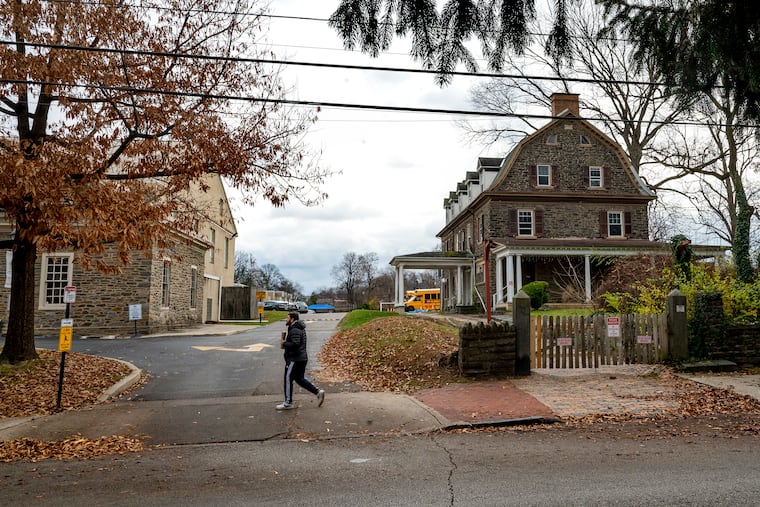City greenlights proposed demolition of historic Germantown house by Pa. School for the Deaf
Despite fierce opposition, Philadelphia's historical commission has approved the Pennsylvania School for the Deaf's request to tear down a 19th century mansion, in part to expand parking on campus.

The Philadelphia Historical Commission on Friday approved a request made by the Pennsylvania School for the Deaf to demolish a historically significant house adjacent to its Germantown campus.
The 11-0 vote followed more than three hours of comments by supporters and opponents of razing 156 West School House Lane, a 19th-century mansion that is listed on the city’s register of historic places.
School officials told the commission Friday that tearing down the house, known as Boxwood, was essential to reconfiguring vehicular and pedestrian traffic, building a cafeteria and other meeting places for students, and adding more parking spaces.
Preservationists and Germantown residents argued that student safety could be enhanced — and land could be made available for building facilities and beautifying the campus — without the loss of a beloved local landmark.
“The Pennsylvania School for the Deaf applauds the Historical Commission on its decision,” Melissa Draganac-Hawk, head of school, said in a statement.
“The decision reflects the committee’s careful consideration of the unique educational needs of our students, important campus safety and traffic considerations, and the school’s commitment to improve and enhance the quality of education,” she said.
Deneene Brockington, chairperson of the Penn Knox Neighborhood Association, said she was disappointed by the vote.
“During this whole process, I don’t feel that the school was open to the idea there could be a solution where both parties could win,” she said. “But the school has been a good steward of their other historic buildings. The school has been an asset to the community, and they will continue to be.”
Paul Steinke, executive director of the Preservation Alliance for Greater Philadelphia, called the vote “a terrible decision for historic preservation” in the region.
“The school clearly purchased the mansion to demolish it, regardless of its historic status,” he said. “And today, the commission let them get away with it.”
» READ MORE: Pa. School for the Deaf wants to raze historic house to improve student safety and campus parking
The commission had been evaluating the request from the school, a private institution founded in 1820, for several months, during which a long-congenial relationship between the campus and the neighborhood has become acrimonious.
The school serves 145 students in grades pre-K through 12. Draganac-Hawk told the commission Friday that about 40% of students are ”deaf-plus,” meaning they have a second disability; 71% live in Philadelphia; and 80% are students of color.
Draganac-Hawk also said that, in addition to increasing safe walking connections among various buildings on campus, the redesign — called for in the school’s strategic plan — aims to increase student opportunities to develop language skills with their peers outside of the classroom.
An evolving neighborhood
The prospect of another elegant old house being lost to “eds and meds” expansion is a sensitive one in Germantown.
The historic Northwest Philly neighborhood already is home to many nonprofit institutions and has seen a substantial amount of demolition — as well as rising residential property values in some areas. And several local residents said Boxwood ought to be redeveloped for residential use.
“It’s been a hard decision,” commission chairperson Robert Thomas said.
An architectural historian, Thomas said the commission had not been aware of the sight lines and other elements deaf people need to safely navigate congested and complicated spaces, such as those found on a campus in an urban neighborhood.
“It’s like a different building code,” he said, adding, “that’s why we came to the conclusion we did.”
Irwin Trauss and his wife, Georgette Bartell, have lived across School House Lane from Boxwood since 1981. Three years later, they supported the school’s move to the former Germantown Academy site.
Noting that the campus improvements will require city zoning reviews, Trauss said they hope Penn Knox and other nearby registered community organizations that oppose the demolition will be able “to renew our conversations with PSD in a less adversarial” way.
As Brockington also suggested in her public comments, Trauss said the goal “is to reach an amicable resolution … that will benefit us all.”
“It is unfortunate that both the community and PSD have had to spend so much time, effort, and money fighting with each other rather than spending an equivalent amount of time, energy, and money finding solutions to our differences,” said Trauss.